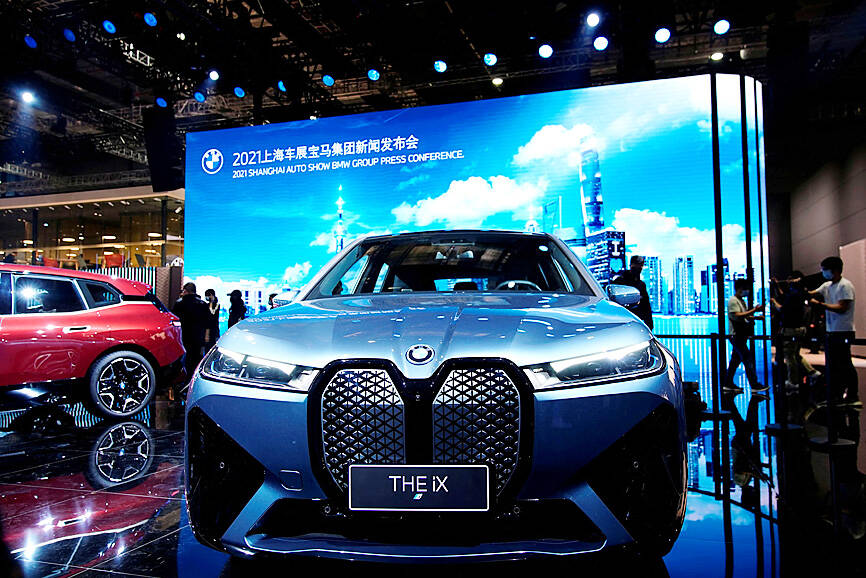A luxury vehicle tax in Singapore is helping push the cost of owning a BMW or Mercedes to the equivalent of a typical local family’s entire income for the year.
In the city-state’s latest bimonthly auction, 125 bidders offered as much as S$116,020 (US$87,334) just for the right to own an “open category” auto, which can be applied toward any vehicle type, but frequently ends up being used for larger vehicles in the densely populated nation.
That means the cost of a 10-year ownership permit — the vehicle is not included — is equivalent to 92 percent of the nation’s median annual household income.

Photo: Reuters
The latest figures come despite government hikes on additional registration fees for vehicles valued at more than S$40,000, a move expected to generate an additional S$200 million in the coming budget year, while impacting the top one-third of newly registered vehicles by market value.
The higher government-imposed fee follows an influx of new wealth from places including Hong Kong, mainland China and India after Singapore became one of the first Asian financial centers to emerge from the COVID-19 pandemic.
However, the latest bidding round shows that the higher tax is not having much impact.
Despite a widely lauded public transit system, in which a bus or subway ride can cost less than S$1, there would always be people in the city of 5.6 million who still want to own a private vehicle — or maybe more than one — and can afford to pay, CIMB Private Banking economist Song Seng Wun (宋城煥) said.
The pricey ownership rights are the result of a quota system that controls the number of autos allowed on the nation’s streets, helping limit congestion and pollution, through the twice-a-month bidding process. Bid successfully and your shiny new Mercedes-Benz becomes roadworthy.
When the overall quota of permits was reduced by 14 percent and premiums skyrocketed to a then-record high in November last year, luxury models benefited the most, with Mercedes vehicles surpassing Toyota models as the top auto brand registered.
In recent months, one in every four vehicles registered was either a Mercedes-Benz or BMW.
Rising prices have also been driven by a growing appetite for electric and hybrid models, which have accounted for more than half of new purchases so far this year. In Singapore, owning a vehicle such as a Tesla Model 3 Performance could quickly surpass US$200,000, depending on the vehicle’s features and the price paid for the permit.
For Singaporeans who just want an ordinary vehicle to get to their office or a weekend movie, the hope is that the supply of 10-year entitlements begins to stabilize, a shift that is expected after an adjustment the government’s Land Transport Authority recently made.
However, for the time being, costs are still trending up.

BYPASSING CHINA TARIFFS: In the first five months of this year, Foxconn sent US$4.4bn of iPhones to the US from India, compared with US$3.7bn in the whole of last year Nearly all the iPhones exported by Foxconn Technology Group (富士康科技集團) from India went to the US between March and last month, customs data showed, far above last year’s average of 50 percent and a clear sign of Apple Inc’s efforts to bypass high US tariffs imposed on China. The numbers, being reported by Reuters for the first time, show that Apple has realigned its India exports to almost exclusively serve the US market, when previously the devices were more widely distributed to nations including the Netherlands and the Czech Republic. During March to last month, Foxconn, known as Hon Hai Precision Industry

Taiwan Semiconductor Manufacturing Co (TSMC, 台積電) and the University of Tokyo (UTokyo) yesterday announced the launch of the TSMC-UTokyo Lab to promote advanced semiconductor research, education and talent development. The lab is TSMC’s first laboratory collaboration with a university outside Taiwan, the company said in a statement. The lab would leverage “the extensive knowledge, experience, and creativity” of both institutions, the company said. It is located in the Asano Section of UTokyo’s Hongo, Tokyo, campus and would be managed by UTokyo faculty, guided by directors from UTokyo and TSMC, the company said. TSMC began working with UTokyo in 2019, resulting in 21 research projects,

Ashton Hall’s morning routine involves dunking his head in iced Saratoga Spring Water. For the company that sells the bottled water — Hall’s brand of choice for drinking, brushing his teeth and submerging himself — that is fantastic news. “We’re so thankful to this incredible fitness influencer called Ashton Hall,” Saratoga owner Primo Brands Corp’s CEO Robbert Rietbroek said on an earnings call after Hall’s morning routine video went viral. “He really helped put our brand on the map.” Primo Brands, which was not affiliated with Hall when he made his video, is among the increasing number of companies benefiting from influencer

Quanta Computer Inc (廣達) chairman Barry Lam (林百里) yesterday expressed a downbeat view about the prospects of humanoid robots, given high manufacturing costs and a lack of target customers. Despite rising demand and high expectations for humanoid robots, high research-and-development costs and uncertain profitability remain major concerns, Lam told reporters following the company’s annual shareholders’ meeting in Taoyuan. “Since it seems a bit unworthy to use such high-cost robots to do household chores, I believe robots designed for specific purposes would be more valuable and present a better business opportunity,” Lam said Instead of investing in humanoid robots, Quanta has opted to invest